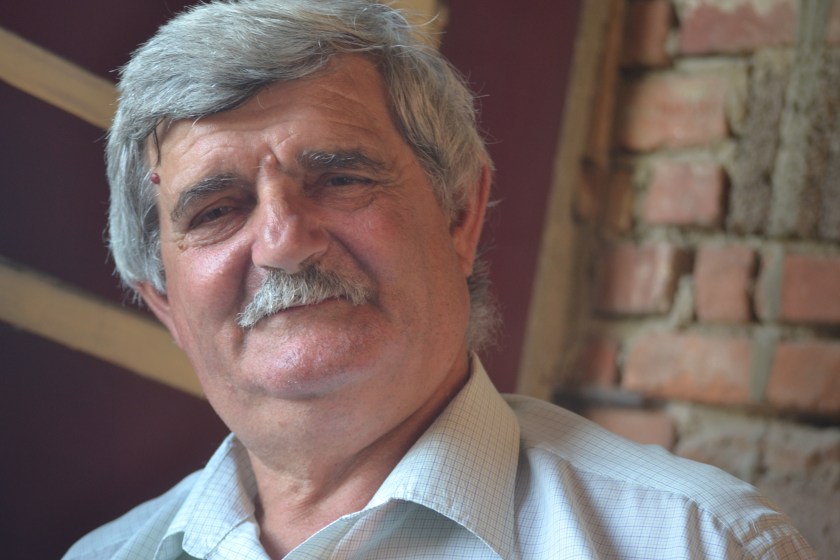
I sit beside them at the handmade table, tucked away in the only shady spot in the courtyard that connects the small home, workshop and barn. The steamy afternoon air is thick with the smell of manure and slop, and the sun is relentless. An old tractor in need of care blocks the entrance to the home that was built by hand decades ago and is repaired by hand as time and weather take their toll. Survival is a way of life. I feel called to be here, in this place on this day, just to see the rutted faces of Lenuta and her husband one more time. Life is carved out hard on faces here in Cliciova, Romania. The lines drawn on brows and cheeks are like the ruts in the roads from wagon wheels and the weight of the horses bound for labor. They are like the paths between the rows of plum trees, with fruit ready to be plucked and eaten in the heat of the day.
They can’t be ignored, they cry out for attention.

They remind me that life has happened here. So much life. Hard, painful life in a place rocked by war – and by liberty. Ioan in the village down the road wears the pain of both on his face. Two dairy cows provide his family with their only income. “I miss the days before,” he softly confesses. “My job was shoveling coal before the revolution. And then I was a tractor driver. But now everything has changed. Everything is private, and the government has changed limits on pension, so I must keep working.” Ioan worked in the very government-run boiler rooms that Communist leader Nicolae Ceaușescu used to oppress the people he had forced from their homes into poorly-built apartments. Heat would be rationed like the bread laced with sawdust. The revolution set people free.
But freedom feels no different than bondage when there are no hands to help the slave learn to walk again.

And the ruts remind me that life will keep going, laboring on, still hoping for the better day to come. Lorena is only 11, but her face already carries so much pain. She knows three words in English. “I love you.” She uses them like a song as she runs to every stranger who comes to her town with food and a smile. It’s in the sports camps crudely set up in pastures or in the listening to a story about a man named Jesus that she sees herself as belonging. Then she returns to the borrowed home she shares with her brother and her mom – and a man who doesn’t feel like family.

Dirt floors and little to eat are her reality. Her mom hopes for more, and left her family for two months to work the fields in Germany. From sunrise to sunset, she stooped in the fields to pick fruit for someone else’s table, and she found rest in a shed with other migrant workers. All in the hopes of making enough money to purchase a cow or a few pigs or some sheep – every animal becoming the thing that might break the chains of poverty.
Because every slave longs to break the chains that bind them.

So I sit at the table, and I look at those faces. I think about my privilege and how it counts for nothing in this land. There are no recommendations for government assistance, no five easy alliterated steps to making things easier, no self-help books or support groups. There is only labor. There is only coming alongside. There is only grace. There is only prayer to a God who is bigger than oppression and stronger than chains. And it’s prayer that has me at the table in this place at this moment. Food has been distributed, clothing has been stacked neatly to share with those who need it, plans have been made to repair roofs. All seems so small now. I ask, “How may I pray for you?” and expect to hear the response that seems to be written into the hearts of the people of Romania. “Maybe health – perhaps safety for the family – I thank you but I do not know what to ask.”
In the same way liberty has not reached their hands, it’s not reached their hearts. The idea of God wanting to hear their words and – even more – wanting to respond to them is a language almost impossible to understand.
Lenuta and her husband look at each other, and she speaks. “That we keep our focus on eternity because life is so short. We have seen God. I had a surgery and there was no medicine to take the pain away. And I made it through the pain thinking about how my Lord suffered on the cross. I am not well still, but there is joy.”
We have seen God. I am the one asking to pray, and now I only long to hear one: that I may see God. I’ve seen so much and received so much in my time on this earth, and yet in this moment I feel as if I’ve not even begun to know the stark brilliance of His reality.
He nods his head. “Pray that I may live a lifestyle of repentance, not taking for granted all He has given us.”
Their words slice through me. I look at my friend, Lindsey. She fights back the tears so eager to flow as we feel divinity breathe for us all. There, in the depths of poverty and oppression, we have been invited to see riches.
“Pray that I may continue to enjoy my salvation.”
The picnic table becomes an altar as I pray that prayer for what feels like the very first time. With all the liberty I’ve been given, I find new liberty reaching my heart. And I become the truly poor, the slave, longing once again to be set free to live the life that is at once short and yet keeps going on. There is aching hope and longing to work the fields – and sit in reverence at the table just a little while longer.
I pray for the beautiful ruts to form on my face. “Yes, Lord, please let me enjoy my salvation.”
